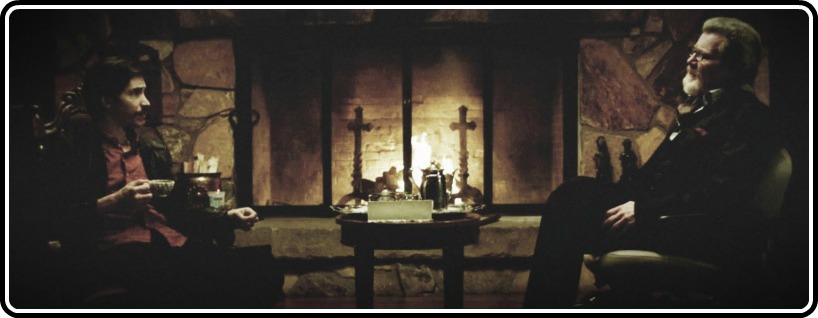
The name Kevin Smith is one that brings with it a lot of emotion. Die hard supporters will look at his canon and find not only the narratives to be uniformly engaging and entertaining but in many ways his aesthetic to be boundary pushing in its lo-fi nature. And then there are his detractors who claim he’s a filmmaker far beyond his time, waxing poetic about superficial ideas in a lazy and uninteresting way. However, he’s never truly made a film quite like his latest, Tusk.
Coming relatively out of nowhere with little publicity behind it (that is until recently following its playing of this year’s Fantastic Fest), Smith’s latest is the director’s first jump directly into the genre, and it’s a head-first plunge, no matter the picture’s quality. Starring Justin Long, Tusk tells the tale of one half of a podcasting duo, a team who fall under the banner of their show “The Not-See Party.” A show where one half interviews a strange or interesting person with the other seemingly interviewing him about what occurred without having seen the goings on. Heading up to Canada to do one of these interviews, Long’s Wallace heads off with the hopes of meeting a YouTube sensation known as “The Kill Bill Kid,” only to discover that that’s not going to be happening anytime soon. So with his hopes dashed, he comes across a flyer offering free room and board for work at the estate of a man known as Howard How. Reading about how he has a cavalcade of stories to tell, Wallace jumps at the offer, only to have his life forever changed once he meets this mysterious adventurer. With some rather polarizing buzz coming out of a brief festival run and a premise and title that hint at a film that sounds like an entirely new change of pace for the ever controversial director.
Too bad it’s in the entirely wrong direction.
Tusk is, sadly, a Kevin Smith film seemingly in name only. Written and directed by Smith, the film sounds like an exciting new expansion aesthetically for a director whose lo-fi style should be ripe for the world of genre cinema. However, with writing and directing credits, Smith appears to be losing more than a step or two here. Visually, the film is unlike any Smith has ever helmed. Taking out much of Smith’s playful energy and edge, the film is instead lifeless, without anything resembling even the weakest of heartbeats. The photography here is muddy and dull, and the use of flashbacks here is jarring at the very best, never allowing the viewer to really get a grasp for the action on screen, or to sink his or her teeth into this tension-free motion picture.
Sadly, the performances aren’t much more entertaining. Long stars here as the unlikeable schlock podcaster whose exploitative manner of garnering a monetary gain is at the heart of the film’s thematic core, yet like the shallow and entirely base level themes, his performance and character is given little to no depth. As we discover things about his character, he’s only made less and less likable, which for any film with themes reaching deeper than a superficial level would mean a really rewarding arch, but is made absolutely dreadful without some much needed nuance. Opposite him are Haley Joel Osment and Genesis Rodriguez as his co-host and girlfriend respectively, both of which are nothing more than window dressing here. The star, if there is one, is an entrancing Michael Parks, who plays Howe in an enjoyably unhinged turn. Holding a few interesting monologues that hint at Smith’s distinct writing style, the character is, in the final act, tossed into a narrative that completely undoes any tension injecting instead something far less intriguing.
Overall, this is a remarkably limp-wristed attempt at horror cinema from a director whose aesthetic should make him a perfect director for the genre. Base level thematically, poorly crafted and far less shocking than it thinks it is,Tusk is ultimately a film that just seems to exist. Pushing out of the viewer little to no emotion or reaction, Smith’s latest is the cinematic manifestation of a shoulder shrug.



![Bergman Island (The Criterion Collection) [Blu-ray]](https://criterioncast.com/wp-content/uploads/2022/11/bergman-island-the-criterion-collection-blu-ray-400x496.jpg)
![This Is Not a Burial, It’s a Resurrection (The Criterion Collection) [Blu-ray]](https://criterioncast.com/wp-content/uploads/2022/11/this-is-not-a-burial-its-a-resurrection-the-criterion-collection-blu-ray-400x496.jpg)
![Lars von Trier's Europe Trilogy (The Criterion Collection) [The Element of Crime/Epidemic/Europa] [Blu-ray]](https://criterioncast.com/wp-content/uploads/2022/11/lars-von-triers-europe-trilogy-the-criterion-collection-the-element-of-400x496.jpg)
![Imitation of Life (The Criterion Collection) [Blu-ray]](https://criterioncast.com/wp-content/uploads/2022/11/imitation-of-life-the-criterion-collection-blu-ray-400x496.jpg)
![The Adventures of Baron Munchausen (The Criterion Collection) [4K UHD]](https://criterioncast.com/wp-content/uploads/2022/11/the-adventures-of-baron-munchausen-the-criterion-collection-4k-uhd-400x496.jpg)
![Cooley High [Criterion Collection] [Blu-ray] [1975]](https://criterioncast.com/wp-content/uploads/2022/11/cooley-high-criterion-collection-blu-ray-1975-400x496.jpg)